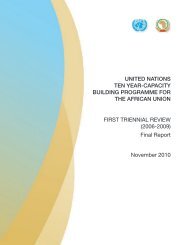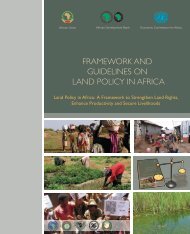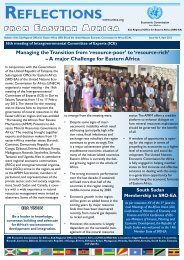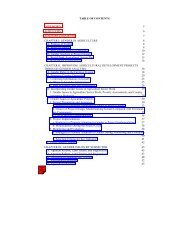A Decade of NEPAD - Economic Commission for Africa - uneca
A Decade of NEPAD - Economic Commission for Africa - uneca
A Decade of NEPAD - Economic Commission for Africa - uneca
You also want an ePaper? Increase the reach of your titles
YUMPU automatically turns print PDFs into web optimized ePapers that Google loves.
Out <strong>of</strong> this <strong>for</strong>um an Interim Steering Committee was<br />
established with South <strong>Africa</strong> elected as Chair, Nigeria<br />
Deputy Chair and Ethiopia serving as Secretary. Indeed,<br />
the Ethiopian Chamber <strong>of</strong> Commerce and Sectoral Associations<br />
was nominated to serve as the organ’s Secretariat.<br />
The Ethiopian government has agreed to provide the body,<br />
renamed the Pan <strong>Africa</strong>n Chambers <strong>of</strong> Commerce (PA-<br />
CoC), with <strong>of</strong>fice space and the AU and UNECA have<br />
pledged to continue <strong>of</strong>fering support as observers <strong>of</strong> the<br />
process.<br />
One <strong>of</strong> the oldest pan-regional business bodies on the<br />
continent, and arguably the body that has been most active<br />
in the <strong>NEPAD</strong> process to date is the <strong>Africa</strong>n Business<br />
Roundtable. Headquartered in Nigeria, the organ is<br />
comprised <strong>of</strong> leading <strong>Africa</strong>n business men and women<br />
and was established in the late 1980s and early 1990s by<br />
the <strong>for</strong>mer president <strong>of</strong> the <strong>Africa</strong>n Development Bank,<br />
Mr. Babacar Ndiaye. The aim <strong>of</strong> the ABR in its early days<br />
was to serve as an advocacy body <strong>for</strong> the <strong>Africa</strong>n private<br />
sector and as a body <strong>of</strong> <strong>Africa</strong>n business ambassadors with<br />
whom international business bodies could engage as they<br />
pursued joint venture and FDI and private sector support<br />
programmes in <strong>Africa</strong>.<br />
As the convening founder and Secretariat <strong>of</strong> the <strong>NEPAD</strong><br />
Business Group, the ABR remains active in promoting<br />
issues related to private sector involvement in <strong>Africa</strong>’s<br />
economic development processes and enjoys an influential<br />
relationship with pan-<strong>Africa</strong>n organs such as the <strong>Africa</strong>n<br />
Development Bank and the <strong>Africa</strong>n Union, in addition<br />
to <strong>NEPAD</strong>.<br />
Beyond the pan-<strong>Africa</strong>n business organs, the Regional<br />
<strong>Economic</strong> Communities have been instrumental over the<br />
past five years in bringing together the private sector in<br />
their respective regions to engage on matters <strong>of</strong> regional<br />
integration and strategy. These regionally focused private<br />
sector bodies have also increasingly sought to facilitate<br />
intra-regional trade, advocate <strong>for</strong> regulatory harmonisation,<br />
and increase the voice <strong>of</strong> industry in government<br />
decision making processes at both the national and subregional<br />
levels. Examples <strong>of</strong> some <strong>of</strong> these organizations<br />
include: the East <strong>Africa</strong> Business Council, the COMESA<br />
Business Council, the SADC Business Council and SADC<br />
Business Forum, The IGAD Business Forum, The West <strong>Africa</strong><br />
Business Association, the ECOWAS Business Forum,<br />
and the West <strong>Africa</strong> Chamber <strong>of</strong> Commerce and Industry.<br />
4. <strong>NEPAD</strong> and the <strong>Africa</strong>n Private Sector Today A <strong>Decade</strong> <strong>of</strong> <strong>NEPAD</strong><br />
However, the challenge with many <strong>of</strong> these regional organs<br />
is that they <strong>of</strong>ten are resource constrained and where not<br />
resource constrained represent a comparatively small<br />
constituency <strong>of</strong> trans-regionally active companies. Yet, as<br />
they provide a unique perspective about where business<br />
impeding red tape, government corruption and bureaucracies<br />
lie, they can <strong>of</strong>fer valuable analysis to regional<br />
economic communities about the member states and as<br />
such, are valuable allies to those working on matters <strong>of</strong><br />
regional integration.<br />
The 2006 analysis on regional integration in <strong>Africa</strong> conducted<br />
by the <strong>Africa</strong>n Union and the <strong>Economic</strong> <strong>Commission</strong><br />
<strong>for</strong> <strong>Africa</strong> and entitled “Assessing Regional Integration<br />
in <strong>Africa</strong> II: Rationalizing Regional <strong>Economic</strong><br />
Communities” 62 found that respondents to the study noted<br />
the following:<br />
“. . . [T]oday the role <strong>of</strong> the private sector in regional integration<br />
is growing. . .. One area where the private sector<br />
can have a positive impact is political decision-making at<br />
the national and regional levels. A well organized private<br />
sector can participate in policy <strong>for</strong>mation, provide advice<br />
to governments, and lobby <strong>for</strong> continued implementation<br />
<strong>of</strong> positive re<strong>for</strong>ms. In this respect, it is important <strong>for</strong> the<br />
private sector to be active in conceptualizing, designing,<br />
<strong>for</strong>mulating and adopting integration programmes. By<br />
providing human and financial resources <strong>for</strong> regional<br />
projects, the private sector also creates jobs, increases<br />
market size, and includes positive externalities, including<br />
technological spill-overs. With the right conditions and<br />
support, the private sector can generate the wealth needed<br />
to stimulate growth and finance regional projects . . . ”<br />
The study further noted that the principal mechanisms<br />
that were used <strong>for</strong> involving the private sector in regional<br />
integration processes were:<br />
ӹ Periodic meetings with the private sector – 84% <strong>of</strong><br />
respondents<br />
ӹ Trade fairs – 68% <strong>of</strong> respondents<br />
ӹ Specific regulation and policy <strong>for</strong>ums – 56% <strong>of</strong><br />
respondents<br />
ӹ Training and seminar programmes – 56% <strong>of</strong> respondents<br />
ӹ National debates and policy <strong>for</strong>ums – 48% <strong>of</strong> respondents<br />
ӹ Exchange programmes – 20% <strong>of</strong> respondents<br />
62 ARIA II: Rationalizing <strong>Economic</strong> Communities, UNECA and AfDB,<br />
2006, pp.86-88<br />
49







